The days are drawing in. A lot of insects are chirping in the field. However, we have had a long spell of hot weather. Temperatures have been around 33 degrees Celsius in Tokyo and have reached 35 degrees Celsius in several areas.
The Danjiri Matsuri (だんじり祭, float festival) will be held on September 15th and 16th, October 6th and 7th in Kishiwada, Osaka. Trial runs of Danjiri are held on September 2nd, 14th and 30th. Although there are various views on its origin, it started in the 18th century.
The festival is famous for speeding floats through the narrow streets with daiku-gata(the most visible member of the Danjiri team) standing on the roofs of the floats.
In contrast, at night, each float is decorated with around 200 lanterns.
Danjiri is a float to draw or to carry. The float appears at many festivals in western Japan. Danjiri in Kishiwada are made of zelkovawood and are adorned with exquisite sculpture. Some say that it is due to the influence of skillful artisans in an area next to Kishiwada who created sculptures in the Nikko Toshogu Shrine.
At most festivals of Shinto shrines, the divine spirits go outside on mikoshi(portable shrine). After the divine spirit moves from the shrine to mikoshi, shrine parishioners carry mikoshi on their shoulders from the shrine to Otabisho(a rest house for the god) through their towns. The spirits stay there for a couple of hours or days. Mikoshi are carried from the rest house to the shrine, and the divine spirit returns to the shrine.
At the Kishiwada Danjiri Matsuri, only danjiri floats go to worship at the shrine and parade through the city.Festive floats lead or accompany mikoshi and play a role in livening up the festival.
This year, Kishiwada became known for a TV drama named Carnation. It is based on the life of the fashion designer Ayako Koshino whose daughters are famous designers Hiroko Koshino, Junko Koshino, and Michiko Koshino.
Kishiwada natives return to their hometowns during this festival. The sisters also return to Kishiwada without fail. Many companies in Kishiwada are closed during this festival.
We associates this thrilling festival with Kishiwada. However, Kishiwada is a castle town having old streets and is also a fishing village. Now we can hold wedding ceremonies in Kishiwada Castle Donjon,
Participants of a town in Kishiwada say at the closing event of the festival, "Ossyan shan no shankorobe(おっしゃんしゃんの しゃんころべ.)" It is said that it means gratitude to a village headman who made a direct appeal to his lord going in a procession. At that time, a direct appeal was strictly forbidden. Petitioners were sentenced to death.
The headman petitioned for reduction of land taxes on behalf of the farmers upon whom heavy taxes had been imposed at prolonged poor harvest time. Although he was executed, dreduction of land taxes was approved in 108 villages.
Incidentally, crossing in front of the feudal lord's procession was considered rude in the Edo Period. So this act could result in the death penalty like the case in the Namamugi Incident in 1862, but there was an exception. People having some sort of job were allowed to do this act in some circumstances.
What kind of job did they do? The answer is midwives heading to assist childbirth.
Kishiwada Danjiri Matsuri
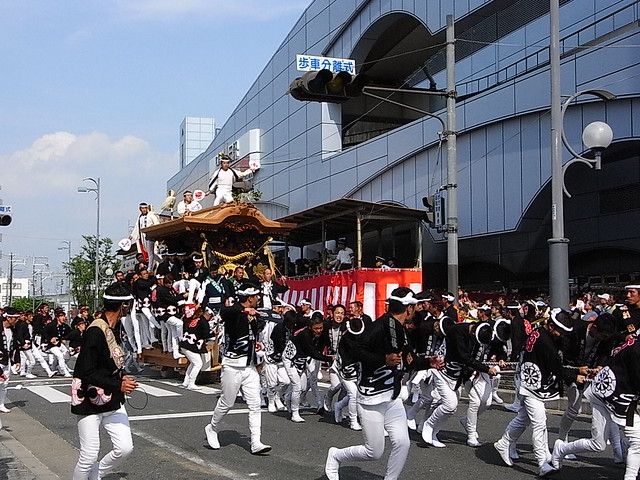 |
| Danjiri by panna noriko /flickr |
Men wearing the same happi coats pull danjiri.
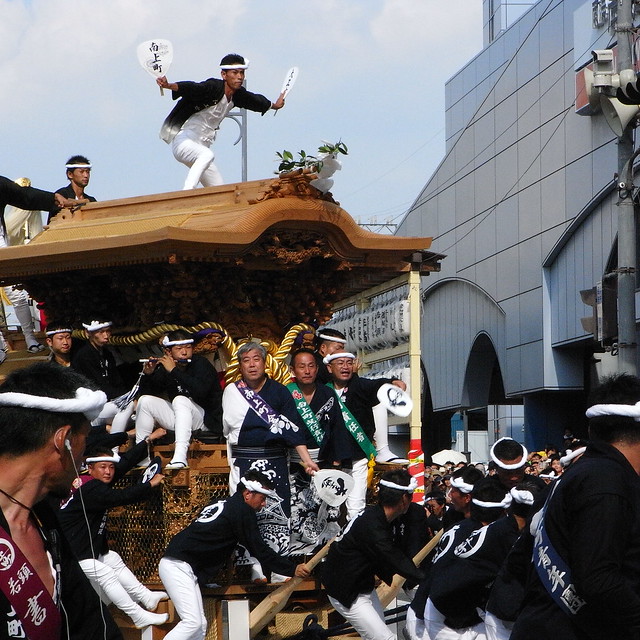 |
| Danjiri by panna noriko /flickr |
daiku-gata standing on the roof of danjiri
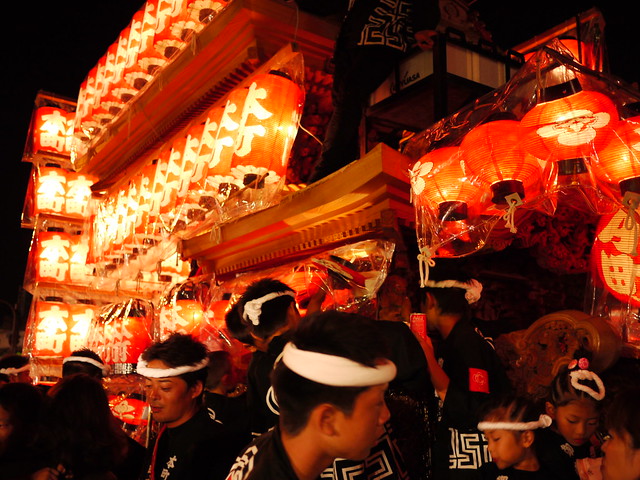 |
| Danjiri by Yakinik /flickr |
danjiri decorated with lanterns
Danjiri, Takarazuka City(宝塚市), Hyogo Prefecture
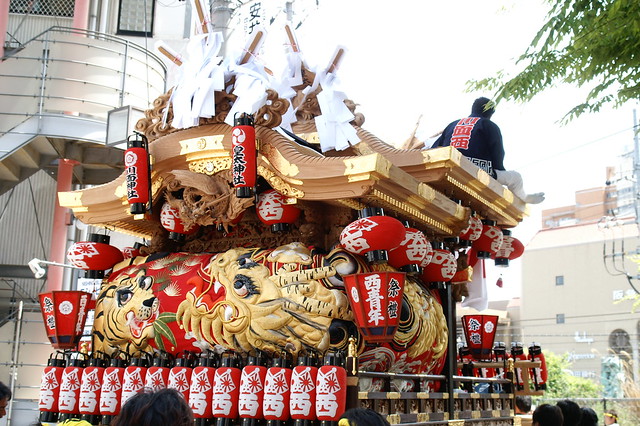 |
| Danjiri (Parade Float) by Hyougushi /flickr |
 |
| Danjiri (Parade Float) by Hyougushi /flickr |
 |
| Danjiri (Parade Float) by Hyougushi /flickr |
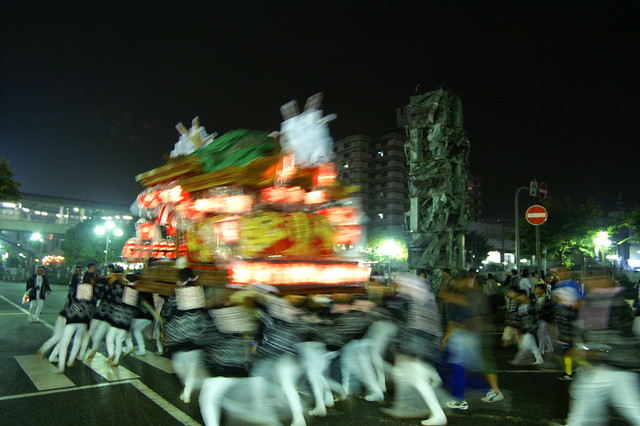 |
| Danjiri @ Takarazuka Station by Hyougushi /flickr |
Saijo Matsuri in Saijo City(西条市), Ehime Prefecture will be held on October 6th, 7th, from 14th to 17th.
 |
| Danjiri Lifting by Ozchin /flickr Sakamoto yatai at Iwaoka Shrine Annual Festival |
Ueno Tenjin Matsuri(上野天神祭) in Iga City, Mie Prefecture will be held on October 23th and 26th.
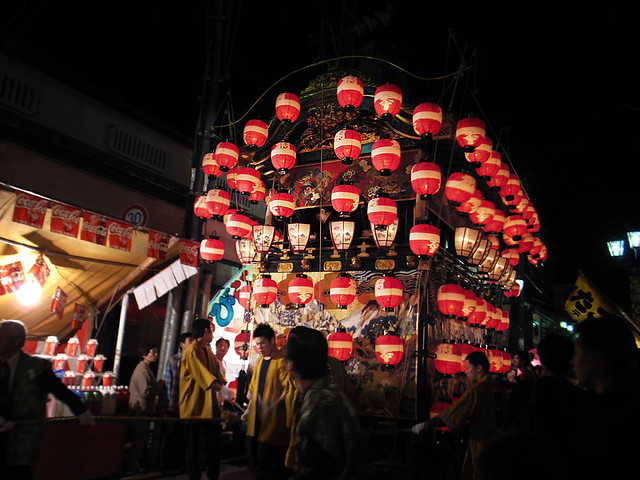 |
| だんじり by eiko_eiko /flickr |
No comments:
Post a Comment